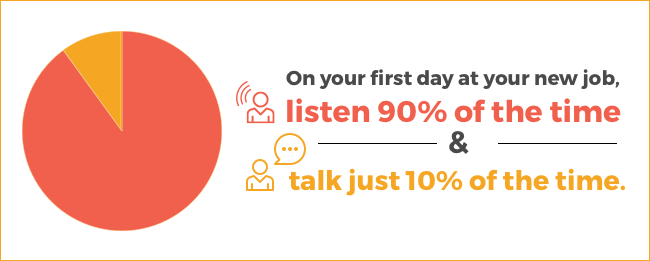19 Tips for Making a Great Impression at Your New Job
You know the importance of a first impression. As a job-seeker, first impressions were very valuable. You made a great one when you learned how to build a resume. And you made another great one again during the interview process. Now that you’ve accepted a new job, first impressions on your first day at work are again of critical importance.
Follow these nineteen tips to help you make a great impression on your first day at work, and avoid the mistakes typically associated with starting a new job.
How to make a great impression at your new job
1. Have a positive attitude
Nothing works better than making a great impression of you on your first day at work than having a positive attitude. Let your enthusiasm for being part of the team and the organization show through to everyone you interact with.
Leave your personal problems at home and concentrate on radiating your excitement for this new professional opportunity.
2. Dress professionally
You should never underestimate the importance of dressing appropriately on your first day at work. The way you dress can impact first impressions significantly.
There are three main clothing options expected today: business professional, business casual, and casual.
- Business professional typically means that you’ll wear a business a suit and tie to work. This type of formal attire can still be found in more traditional industries, such as financial services or banking.
- Business casual is typically a step down from professional attire. It often means that you would wear khaki pants and a dress shirt, or something similar. This dress is very common for many fields, including engineering, marketing, and accounting. In some cases, a business will allow their employees to dress casually. Casual dress typically refers to jeans and a casual shirt.
Dress code varies by workplace. The best way to decide what you should wear is to ask, and to observe those around you.
3. Learn coworkers’ names quickly
No one expects you to have everyone’s name down by the end of the first day at work, but if you are bad with names, now is the time to spend more time on remembering names.
For each person you meet, try to collect a business card. When you have a free moment, jot down a few notes on the back of the card. Include a few facts that you learned about the person. Then, occasionally, study the cards to remind yourself of the new people on the team. This trick can often help you to learn names at a faster pace.
4. Ask questions/ask for help
No one expects you to know everything on your first day at work, so ask questions or ask for help when you need it. Remember that it’s better to ask for clarification before you’ve spent time completing a task the wrong way.
Listen to your coworkers, ask questions, and communicate openly with your supervisors about any concerns that arise. No one expects you to know it all in the first weeks and months of a new job.
5. Take notes and go to orientation
Take notes on all the systems and rules of your new organization on your first day at work. Attend all orientation sessions and accept any training that you are offered. Study your onboarding manual, if you’re provided with one. Nothing will get you up to speed at a new job faster. Your participation shows interest and ambition, and an eagerness to get on board fast.
6. Take initiative
In most situations, you will be given small doses of work at the beginning of a new job, especially on your first day at work. Starting slowly allows you to get your feet wet without getting overwhelmed. As you finish assignments and are ready to handle a bigger workload, take the initiative and ask for more assignments.
7. Learn everything you can about your new employer
In theory, you should have already done your homework during the interviewing process, but there is always a lot more to learn once you’re on the inside.
Get an employee handbook on your first day at work and study it. Read reports and company literature to become an expert on your organization. You may also find great information on the press page of your new company’s website, or on internet news websites.
8. Arrive early, leave late and don’t call in sick
Come in on time, perhaps even early. Then, stay a little late. Remember, you can’t be a go-getter and clock-watcher at the same time, so plan to be at work a little longer than your typical eight-hour workday (at first).
Don’t take long lunches, especially on your first day at work. Once you understand the office culture better, you may be able to shift your hours or take longer lunches but in the beginning, err on the side of spending more time at work to make a great first impression.
Taking these steps will help you to establish a good attendance record. Yes, there will be emergencies, and, yes, you may get sick, but as best you can, try to make it to work every day during those first weeks and months on the job.
9. Avoid office politics and gossip
This one can be tough. The workplace can be full of rumors and gossip. Your mission should be to stay above the fray. Avoid the office gossips and don’t get involved in any office trash talk or politics, especially on your first day at work. Repeating gossip will do nothing to help you make a good first impression at a new job.
Stay away from office politics for as long as you can. Eventually, you will be exposed to them, but keep yourself neutral on political workplace issues for as long as you can.
10. Keep personal business on company time to a minimum
Studies show that just about everyone conducts some amount of personal business on company time — checking email, making dinner reservations, texting, shopping online. Your goal is to keep your personal business to a minimum and stay focused on work – especially on your first day at work.
If you need to make a personal call, step away from your desk. If you need to make a reservation or take care of other business online, do it quickly and discreetly, and, if possible, do it from your cell phone.
11. Take advantage of after-hours activities
Many organizations have formal or informal after-hour activities, such as sports leagues. Get involved — even if only as a cheerleader — because these types of activities are great ways to bond with your coworkers. Do be on your best behavior during these outside-work activities, though.
“If attending happy hours with co-workers, never drink more than one drink,” suggests Anne Johnson, senior corporate relations coordinator for the U.S. Chamber of Commerce, recalling a coworker who came to a happy hour and had too much to drink. “Now, no one will invite her again. You don’t want to make a stupid mistake like that.”
12. Listen more than you talk
On your first day at work, listen 90% of the time, and talk just 10% of the time. Listening more than you talk can be one of the hardest skills to learn, especially for extroverts. However, you don’t want to get the reputation as the office know-it-all — or worse, someone who always has to have the limelight. If you have a legitimate contribution, make it, but if not, do more listening and absorbing during those first days on the job.
13. Track accomplishments
From the start of your new job, begin to track your accomplishments. You may have so many different projects going on at any given time that it becomes difficult to remember everything you have accomplished over time. Start now and you will build this practice into your routine.
Your accomplishments are great for a variety of reasons. They can help you to improve your own performance over time. They can also be great for your personal satisfaction, for increasing your chances of receiving a raise or promotion down the road, and for future job-hunting.
Accomplishments are the sort of thing you want to include on your resume. If you wait until you’re looking for a new job, it can be far harder to track accomplishments than if you do it today. They are also a great resource for when you go through your annual performance review process. Having a list of your accomplishments demonstrates your impact in the best possible way.
14. Show appreciation
It’s important to show your appreciation at work for the help that others will give you. And, nothing shows appreciation as well as kindness and a genuine sentiment.
Show your appreciation to everyone who helps you learn the ropes during your first day at work — from your coworkers to receptionists to the folks in human resources. Recognizing those who have helped you get acclimated will show your gratitude, which will do wonders for making a good first impression.
To show your appreciation, start with these two very simple words: “thank you.” You may want to also follow up your verbal appreciation with a handwritten thank you note, or a thank you email. If the person has really gone out of their way for you, consider treating them to lunch, or purchasing a small gift for them (such as cookies).
15. Find a mentor
You don’t need to jump on this task on your first day at work, but as you get introduced to senior staff, begin thinking about developing a mentoring relationship with a senior person in the organization. Mentoring has numerous benefits, from a simple sounding board to someone who helps direct and advance your career within the organization.
16. Get and stay organized
If you’re one of those super-organized people, this tip will be easy for you. The rest of us, however, need to develop a system for keeping track of meetings, appointments, assignments, and projects.
Get an organizer or planner and keep on top of all your work. Use an online calendar with reminders set for important deadlines. Make an Excel spreadsheet or just write a simple to-do list at the beginning and end of every day. Everyone has a different system that works best for them.
17. Set goals
As you look ahead, set goals for yourself and then strive to achieve them. Revise your goals list every few months. What’s important to you in your first three months of a job will be different from when you have when you’ve been in a position for six months.
18. Make a date with your boss
Having a weekly meeting with your new boss to keep him or her informed of how you are doing is very important. In addition to helping you stay on track with assignments and deadlines, meeting with your boss helps establish a rapport and relationship.
It is likely that your new boss will not initiate setting up a weekly meeting with you. That’s okay. Ask your boss verbally if he or she is okay with meeting, agree on a time, and then send your boss a recurring meeting invitation.
19. Network – both in and out of the office
At work, take advantage of every opportunity to network with key people by attending staff meetings, professional organization conferences, and trade shows. Use every opportunity to meet colleagues in your field. Networking with key people can help you to identify mentors within your organization.
Outside of work, join an organization or take additional classes to stay ahead in your field. Just because you have a new job does not mean that you should suspend your networking. Even in a new job, you should constantly be managing and growing your network of contacts.
Final thoughts on your first days on the job
Being the newest member of the organization — the rookie — is both challenging and exciting. Don’t worry if you don’t make a perfect first impression on your first day at work — few of us ever do.
Remember to relax, keep your mind open, get to know your team members, and do your work. These things should help you go far in making a positive and lasting impression at your new job. Best of luck on your first day at work — and all the days that follow, too!








